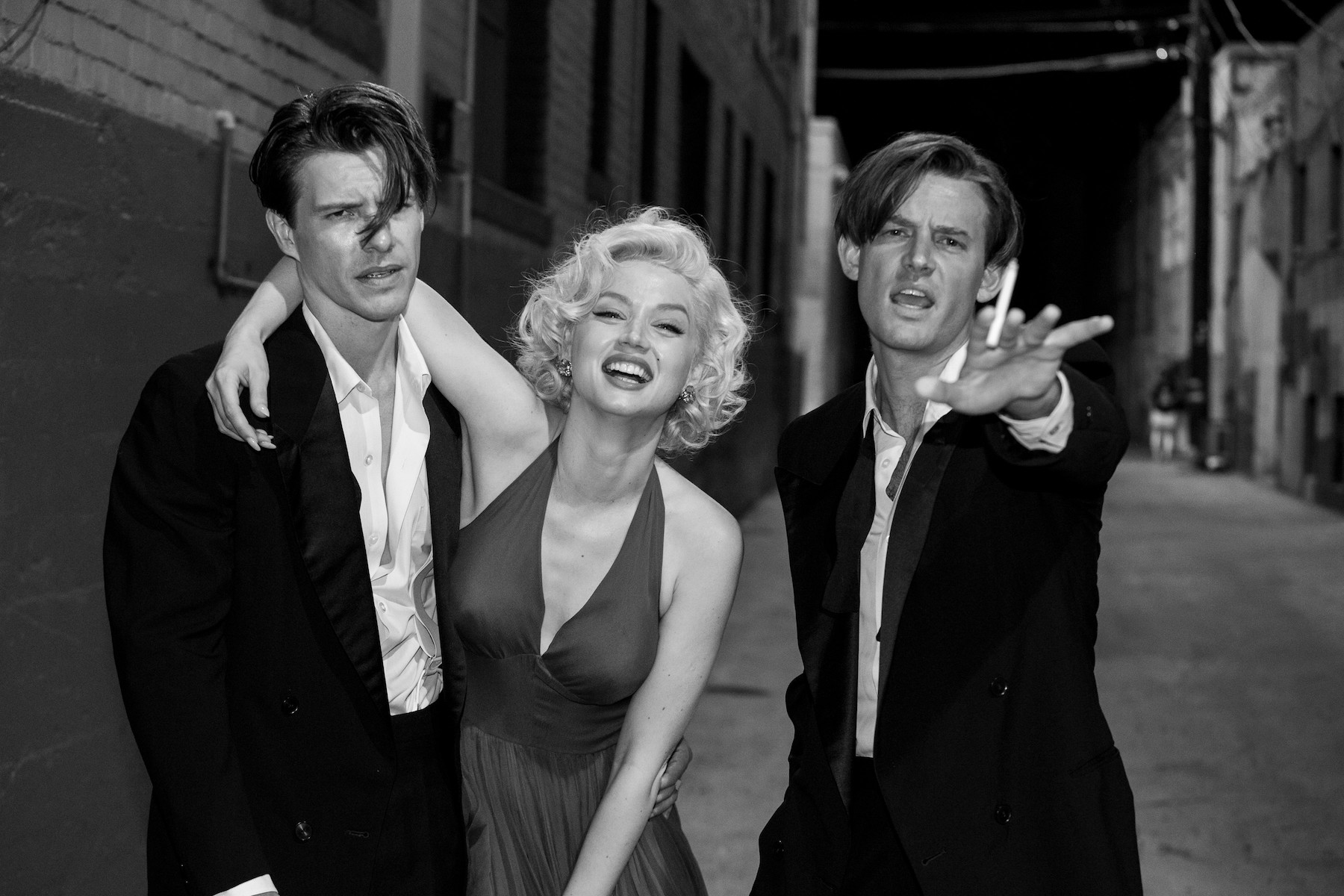Andrew Dominik’s Blonde is an atrocity – a ghoulish biopic of Marilyn Monroe that luxuriates in her maltreatment and misery, culminating in protracted images of the star’s lonely death from barbiturate pills distractedly swallowed like candies and washed down with Scotch in her Los Angeles bungalow.
Ana de Armas’s expressions too often make Monroe a rabbit in the headlights, but that’s writer-director Dominik's fault. Whether the movie’s Monroe is on or off camera, De Armas speaks with that breathy undulating voice of incredulity Monroe impersonators use, but her real voice was softer and more measured. Nonetheless, the Cuban-Spanish actress could win awards for her uncanny performance – if only she had given it in a film with an ounce of compassion and warmth for the brave spirit of Norma Jeane Baker instead of in this reptilian exercise in gloating schadenfreude.
Spuriously commenting on the systemic misogyny that consecrated Monroe as the Playboy-era patron saint of mindless sex dolls – Billy Wilder’s nasty joke in both The Seven Year Itch and Some Like It Hot – Blonde gruesomely embodies that misogyny. If it had a conscience about Monroe’s exploitation, it wouldn’t have demanded de Armas go topless so often.
Google Monroe’s name enough and one eventually comes across a police photo of her in her deathbed on the morning of August 5, 1962. Dominik has no compunction about re-creating the photo, only to resurrect de Armas’s Monroe and have her flit around the room, hunted and paranoid. At one point, she realises she has mislaid her wallet – a metaphor, perhaps, for the loss of her identity, fatally sacrificed to fame as a sex symbol. But if it is a metaphor, it’s weakened by the suggestion the wallet was grabbed by a fleetingly seen burglar, a spook, the sole tantalising hint in the film of an FBI-White House conspiracy against Monroe.
 Like Joyce Carol Oates’s source novel (originally filmed as a miniseries in 2001), Blonde doesn’t invoke (and therefore doesn’t implicate) Robert F Kennedy in Monroe’s demise, but his brother “the President” (Caspar Phillipson, who played JFK in Jackie) is on hand to defile her in close-up.
Like Joyce Carol Oates’s source novel (originally filmed as a miniseries in 2001), Blonde doesn’t invoke (and therefore doesn’t implicate) Robert F Kennedy in Monroe’s demise, but his brother “the President” (Caspar Phillipson, who played JFK in Jackie) is on hand to defile her in close-up.
The movie climaxes when he climaxes in Monroe’s mouth and calls her a “dirty slut”. On the Presidential tongue as he orgasms is the c-word – he utters the hard "c" – which Kennedy uses on her in the novel. Perhaps Netflix balked at the full obscenity. Why then not balk at the entire foul sequence, or does it pass as truth-telling?
Blonde, which meaninglessly intercuts between black-and-white and colour cinematography, begins with a moment of stunning originality: Monroe having her white Seven Year Itch dress blown skywards from her thighs as she stands over a subway grating. How on earth did they come up with that one? (Pictured above: Adrien Brody, Ana de Armas)
It’s then back to 1933 and seven-year-old Norma Jeane (Lily Fisher) being tortured by her mentally ill single mother Gladys (Juliannne Nicholson, haunting in the role). Sparks fly, water bubbles, filicide looms. Dominik (Chopper, The Assassination of Jesse James by the Coward Robert Forde) is a skilled metteur-en-scène and the passage is genuinely disturbing – a Hollywood Gothic nightmare.
The scar left on the child is psychological. Gladys’ birthday present to her is a portrait of her absent father – a Clark Gable lookalike, if not the King of Hollywood himself. And so when Monroe eventually strikes out for marital happiness with the Ex-Athlete (Bobby Cannavale as Joe DiMaggio) and then the Playwright (Adrien Brody as Arthur Miller), neither of whom is equipped to slay her demons, as if anyone would have been, she calls each of them “Daddy” in turn. The Ex-Athlete slut-shames her for having done nudie photos and beats her up. The Playwright casts doubt on her having read Chekhov, just as a studio boor who gave her an early screen test doubted that she’d read Dostoevsky.
As it unspools, Blonde – ploddingly episodic and lacking a cause and effect structure – shirks empathy with its subject. It makes no concerted effort to give Monroe credit for her intellectual striving, her determination to succeed, her attempts to improve as an actress (she did, exponentially), her charisma on or off screen, her humour, or her kindness to children. It demonstrates no significant interest in any of these qualities.
 Yet it so explicitly foregrounds the Freudian theme it surprisingly doesn’t re-create Monroe performing “My Heart Belongs to Daddy” (in Let’s Make Love). Instead, de Armas sings and dances to “Diamonds Are a Girl’s Best Friend”. She’s magnificent – no mere material girl – but the way the number is chopped up lends an irony to an already ironic context.
Yet it so explicitly foregrounds the Freudian theme it surprisingly doesn’t re-create Monroe performing “My Heart Belongs to Daddy” (in Let’s Make Love). Instead, de Armas sings and dances to “Diamonds Are a Girl’s Best Friend”. She’s magnificent – no mere material girl – but the way the number is chopped up lends an irony to an already ironic context.
Though desperate for a child, Monroe had a series of illegal abortions in order not to breach her contract with 20th Century-Fox. She allegedly told a friend she had 12 such procedures; the movie has one of the unborn fetuses pipe up, fearful of its fate. "For this I killed my baby?” Monroe mutters, watching herself perform “Diamonds” at the Gentlemen Prefer Blondes premiere in Blonde. Thus, the payoff for de Armas’s work on the scene is a bitter two-second rumination.
It never becomes clear what Monroe wants most – her real father or a baby. Could she have been seeking self-worth? No one can tell from Blonde because it derides her as a neurotic sexpot, and what would she therefore want with validation? What does for her, finally, is not her Icarus-like flight into the corridors of power but a vicious practical joke played on her by the louche Hollywood scions Charlie “Cass” Chaplin Jr. (Xavier Samuel) and Eddy Robinson Jr. (Evan Williams), with whom she’s shown indulging a troilistic early 1950s affair. Extrapolated from the novel, this is the movie’s greasiest episode. (Pictured above: Xavier Samuel, Ana de Armas, Evan Williams)
We learn that Monroe did Gentlemen Prefer Blondes so as to not enrage her studio boss Darryl F Zanuck, who had bought Anita Loos’s novel to provide her with a vehicle. Opting out, after all, would have been no way to repay the Mr. Z (David Warshofsky) who is shown raping Monroe in his office when she is brought there as an aspiring starlet. There’s no evidence Zanuck raped her in reality, though certainly his sometime colleague Joseph M Schenck furthered her career in return for sexual favours. Schenck is absent here, but not to worry: there are pigs aplenty at the trough.
Blonde doesn’t whitewash the stains on the casting couch of the Hollywood studio system, but its exploitation of both Monroe and de Armas posits it as a flagrant reaction to films (including Bombshell, Promising Young Woman, and The Assistant) prompted by the #MeToo movement. Norma Jeane deserved better. She deserved to be liberated from all the myths and clichés – and all the positions in the sex wars – but then Netflix wouldn’t have financed a Marilyn Monroe movie without a gust of air and an upskirt shot.















Add comment